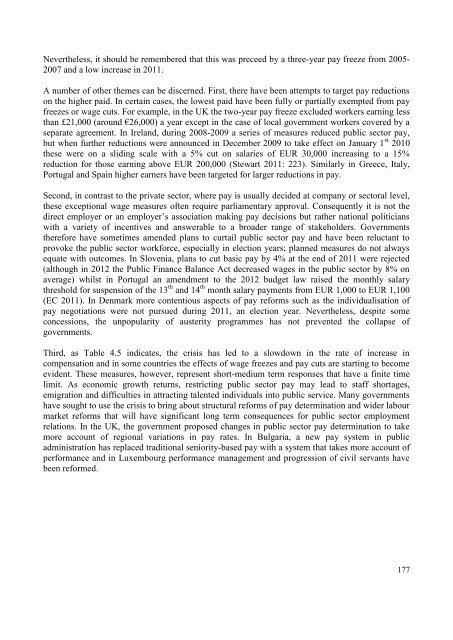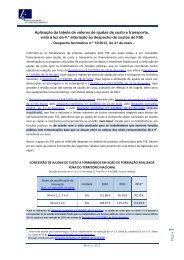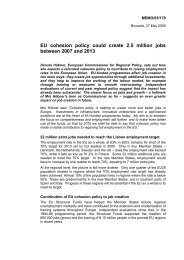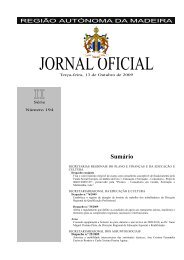Industrial Relations in Europe 2012 - European Commission - Europa
Industrial Relations in Europe 2012 - European Commission - Europa
Industrial Relations in Europe 2012 - European Commission - Europa
Create successful ePaper yourself
Turn your PDF publications into a flip-book with our unique Google optimized e-Paper software.
Nevertheless, it should be remembered that this was preceed by a three-year pay freeze from 2005-<br />
2007 and a low <strong>in</strong>crease <strong>in</strong> 2011.<br />
A number of other themes can be discerned. First, there have been attempts to target pay reductions<br />
on the higher paid. In certa<strong>in</strong> cases, the lowest paid have been fully or partially exempted from pay<br />
freezes or wage cuts. For example, <strong>in</strong> the UK the two-year pay freeze excluded workers earn<strong>in</strong>g less<br />
than £21,000 (around €26,000) a year except <strong>in</strong> the case of local government workers covered by a<br />
separate agreement. In Ireland, dur<strong>in</strong>g 2008-2009 a series of measures reduced public sector pay,<br />
but when further reductions were announced <strong>in</strong> December 2009 to take effect on January 1 st 2010<br />
these were on a slid<strong>in</strong>g scale with a 5% cut on salaries of EUR 30,000 <strong>in</strong>creas<strong>in</strong>g to a 15%<br />
reduction for those earn<strong>in</strong>g above EUR 200,000 (Stewart 2011: 223). Similarly <strong>in</strong> Greece, Italy,<br />
Portugal and Spa<strong>in</strong> higher earners have been targeted for larger reductions <strong>in</strong> pay.<br />
Second, <strong>in</strong> contrast to the private sector, where pay is usually decided at company or sectoral level,<br />
these exceptional wage measures often require parliamentary approval. Consequently it is not the<br />
direct employer or an employer’s association mak<strong>in</strong>g pay decisions but rather national politicians<br />
with a variety of <strong>in</strong>centives and answerable to a broader range of stakeholders. Governments<br />
therefore have sometimes amended plans to curtail public sector pay and have been reluctant to<br />
provoke the public sector workforce, especially <strong>in</strong> election years; planned measures do not always<br />
equate with outcomes. In Slovenia, plans to cut basic pay by 4% at the end of 2011 were rejected<br />
(although <strong>in</strong> <strong>2012</strong> the Public F<strong>in</strong>ance Balance Act decreased wages <strong>in</strong> the public sector by 8% on<br />
average) whilst <strong>in</strong> Portugal an amendment to the <strong>2012</strong> budget law raised the monthly salary<br />
threshold for suspension of the 13 th and 14 th month salary payments from EUR 1,000 to EUR 1,100<br />
(EC 2011). In Denmark more contentious aspects of pay reforms such as the <strong>in</strong>dividualisation of<br />
pay negotiations were not pursued dur<strong>in</strong>g 2011, an election year. Nevertheless, despite some<br />
concessions, the unpopularity of austerity programmes has not prevented the collapse of<br />
governments.<br />
Third, as Table 4.5 <strong>in</strong>dicates, the crisis has led to a slowdown <strong>in</strong> the rate of <strong>in</strong>crease <strong>in</strong><br />
compensation and <strong>in</strong> some countries the effects of wage freezes and pay cuts are start<strong>in</strong>g to become<br />
evident. These measures, however, represent short-medium term responses that have a f<strong>in</strong>ite time<br />
limit. As economic growth returns, restrict<strong>in</strong>g public sector pay may lead to staff shortages,<br />
emigration and difficulties <strong>in</strong> attract<strong>in</strong>g talented <strong>in</strong>dividuals <strong>in</strong>to public service. Many governments<br />
have sought to use the crisis to br<strong>in</strong>g about structural reforms of pay determ<strong>in</strong>ation and wider labour<br />
market reforms that will have significant long term consequences for public sector employment<br />
relations. In the UK, the government proposed changes <strong>in</strong> public sector pay determ<strong>in</strong>ation to take<br />
more account of regional variations <strong>in</strong> pay rates. In Bulgaria, a new pay system <strong>in</strong> public<br />
adm<strong>in</strong>istration has replaced traditional seniority-based pay with a system that takes more account of<br />
performance and <strong>in</strong> Luxembourg performance management and progression of civil servants have<br />
been reformed.<br />
177

















